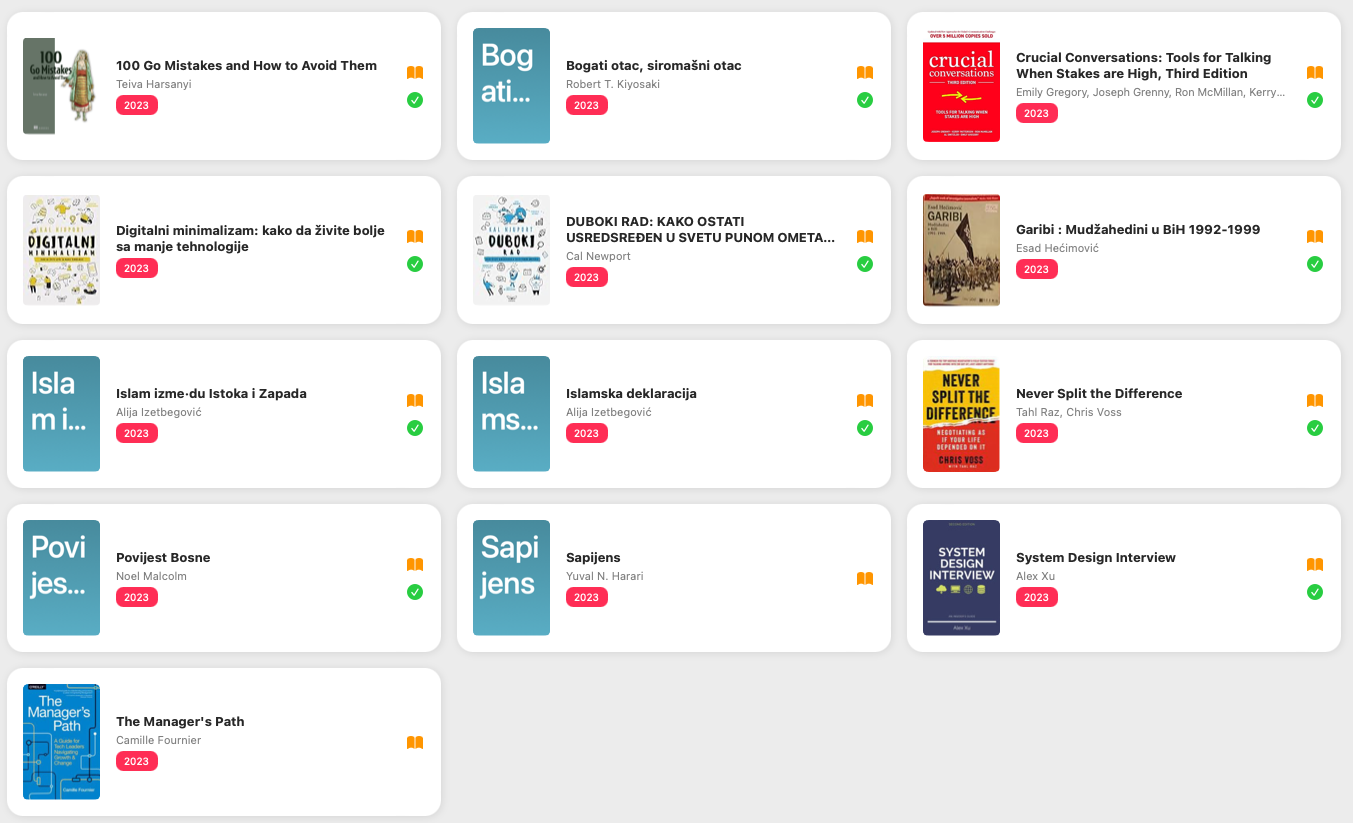I started keeping track of the books I read towards the end of the year. Starting next year, I would like to have a chart that shows the number of pages read over time (by day, week, month). Although I would have liked to have more time and motivation to devote to books, other commitments (primarily university in the second half of the year) made this difficult for me.
For entering books and tracking reading progress, I use Book Tracker (available only for Apple devices).
Below is a list of books I read in 2023, with brief summaries arranged in chronological order of reading. I have read other materials, but not all books cover to cover, so they are not listed here.
The books I have read are mostly not entered in the app, so they appear with cover (in the image below):

“Islamic Declaration” and “Islam Between East and West” are works in which Alija Izetbegović, the first president of RBiH, criticizes the then prevailing system in Yugoslavia (Communism / Socialism) and presents Islam as a solution to all social, economic, legal, and social problems faced by the East and West. In “Islam Between East and West,” Izetbegović details examples of the flaws of these systems and how Islam can solve these problems.
“A Short History of Bosnia” by Noel Malcolm provides a detailed and comprehensive overview of the history of Bosnia from the earliest days to the modern era in a very readable manner. Malcolm explores the complexity of Bosnian history, including its cultural and ethnic diversity, political upheavals, and wars.
“Never Split the Difference” by Chris Voss, a former FBI hostage negotiator, offers insights into negotiation strategies and tactics applicable in everyday life and business. The book emphasizes the importance of emotional intelligence, listening, and psychological techniques in negotiation, rather than traditional compromise, and offers readers tools for achieving their goals while maintaining positive relationships.
“Garibi: Mujahideen in BiH 1992-1999” by Esad Hećimović, deals with the topic of the participation of foreign Islamic fighters, known as mujahideen, in the war in Bosnia and Herzegovina from 1992 to 1999. Hećimović explores their arrival, role in the conflict, interaction with the local population, as well as the impact of their presence on the course of the war and post-war political and social dynamics in Bosnia and Herzegovina.
“Deep Work” focuses on the importance of deep, focused work in an era of pervasive distractions. The author, Newport, offers strategies for developing the ability to deeply concentrate on a task, arguing that this skill is key to achieving high professional achievements.
“Digital Minimalism” proposes a philosophy of consciously limiting the use of digital technologies – primarily mobile phones and social networks. Newport advocates a methodical approach to using digital tools, choosing those that directly contribute to an individual’s values and goals, while avoiding those that are distracting or unproductive.
“Rich Dad Poor Dad” is a book that deals with financial education, exploring the differences in mindset and approaches to money between Robert’s “rich dad” (his mentor) and “poor dad” (his biological father). Robert uses these two figures to highlight the importance of financial literacy, investing, entrepreneurship, and breaking the traditional understanding of work and earnings.
“Sapiens” is a comprehensive history of the human species, from the emergence of Homo sapiens in the Stone Age to the modern era. The author, Harari, explores key points in the development of humanity, such as the cognitive revolution, the agricultural revolution, the emergence of empires, scientific development, and technological advancement.
The books listed below are technical literature in the field I am involved in:
“100 Go Mistakes and How to Avoid Them” – describes the most common mistakes made when writing code in Go (programming language) and how to avoid them.
“System Design Interview” – provides detailed explanations of questions and answers in job interviews at major IT corporations (MAAMA), regarding the architecture of large and complex systems.
“The Manager’s Path” – discusses the journey, challenges, and solutions for engineers progressing through their career to a manager responsible for a large number of teams.
After finishing “Sapiens,” I plan to read the following books:
Remembering God – Reflections on Islam (Gai Eaton). I bought all of his works and plan to intersperse them among other books.
The Software Engineer’s Guidebook: Navigating senior, tech lead, and staff engineer positions at tech companies and startups (Gergely Orosz). Since I have been following his newsletter for a long time, he recently published a book that I ordered and plan to read.
One Soldier’s War – The experiences of a Russian soldier in the first and second Chechen wars.



